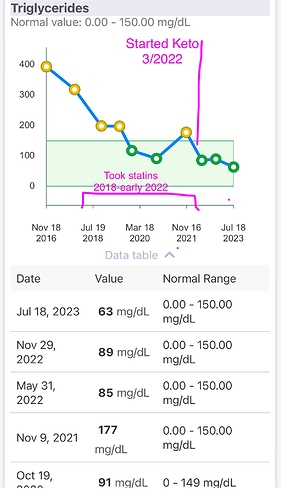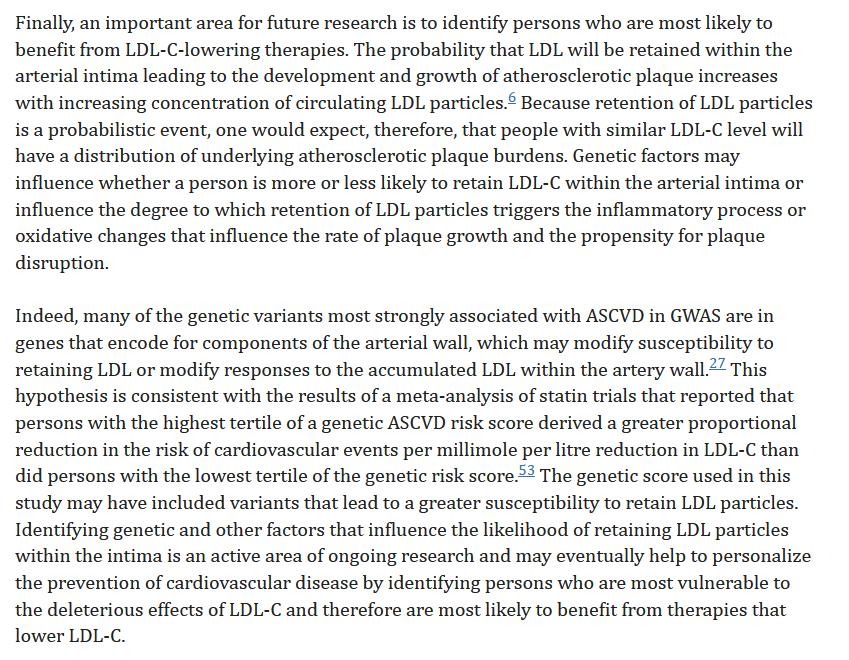This was the big one. This is Citizen Science and Matt Budoff with the Miami Cohort Study
Matt Budoff LMHR CoSci
Loved that you shared this, thank you.  I listened intently to this because my LDL has gone back up on Keto (previously brought down by statins) but it had never been higher than 160 before and that was the number that got me prescribed statins. It had gone up to 170 on Keto but has since come down to 144. Can’t wait to see what it will be this year.
I listened intently to this because my LDL has gone back up on Keto (previously brought down by statins) but it had never been higher than 160 before and that was the number that got me prescribed statins. It had gone up to 170 on Keto but has since come down to 144. Can’t wait to see what it will be this year.
But my HDL has always been pretty low. This presentation’s study looked at people with much higher HDL than I have, like 80-90, so that’s kind of frustrating for me. But I like how he shared that there really are no good therapies that can increase HDL. Possibly I’m just wired to always be low? Of course he said low was 40 or below and I hold pretty steady around 50-60. (I was 35 in 2016 but never since)
Mine was always low before going keto. I started to eat cod livers , sardines, Intake fish oil tablets or Carlson’s cod liver. Now my HDL equals my trigs
They have high HDL because they are lean and typically athletic and eating keto. If you are lean, you might get there or if you get lean, you might get there.
But 50-60 is not bad. What are your triglycerides?
63 Lowest they have ever been
They were ridiculously high 2016-2018. Statins helped but Keto is doing just as good without them.
Just got blood work done after being carnivore for 11 months. At the six month mark my LDL was 225 but this time it was down to 190 dang it. I hope it doesn’t go much lower.
But on a positive note, my Trigs were 66 and my HDL was 66 so the ratio comes out to 1.
I watched this until he started taking questions. There was someone here who did CAC scans, and he said the CAC values were not related to LDL, which is what this study found too.
But the idea of LDL is that it’s CAUSAL. That means, it causes heart disease. But how can it be causal if people with FH, who we KNOW have high LDL for decades, get CAC scores of zero? To me, that means LDL cannot be causal.
Assuming that something else causes heart disease, should LDL be lowered? Could higher LDL cause higher atherosclerosis in a person who has whatever causes atherosclerosis? I doubt this, because the very few studies done where they look at LDL reduction due to drugs (has to be the same drug at two different doses or the same drug at the same dose and comparison of LDL reduction), the level of LDL reduction doesn’t help.
What about Lp(a)? Would higher Lp(a) mean that there’s higher atherosclerosis for those people who have whatever causes atherosclerosis? That’s a tougher one, because studies indicate this is true, but there’s basically nothing that lowers Lp(a), so there are no studies about what happens when you do lower Lp(a).
The fact that people with high LDL have zero CAC scores simply means that high LDL does not cause a high CAC score. It does not exonerate LDL from a causal role in heart disease unless you’re saying that without a high CAC, heart disease does not occur.
To be clear, I am utterly unconvinced that LDL level is causally linked to heart disease in some other way, I’m not sure it really indicates anything at all.
The fact that people with high LDL tend to get cardiovascular disease at a significantly lower rate, however, is sufficient to say that LDL cannot be the cause of cardiovascular disease.
Otherwise, Ancel Keys would not have had to cherry-pick 7 out of 23 countries to publish the data from his so-called “Seven Countries Study.” The full data set shows no correlation between saturated fat intake and coronary heart disease.
Interestingly, however, the data show a strong correlation between sugar intake and coronary heart disease, both in the data for the seven published countries and in the full data for 23 countries. Keys dismissed this correlation out of hand, for some unknown reason. Purely by co-incidence, of course, this was around the same time the sugar industry was paying friends of his to play up the dangers of fat consumption and play down those of sugar consumption.
All I’m saying is that CAC scores of zero do not exonerate LDL, these two numbers are apparently unrelated, in terms both any correlation between the two, and causality of CVD. As you say, LDL is more clearly exonerated by the simpler fact that there does not seem to be any positive correlation between high LDL and heart disease, if anything the correlation is inverse. Truthfully, for all we know a healthy heart or some other contributing factor in a healthy heart causes LDL to rise rather than LDL being causative of heart health, in the way that a temperature of 98.6 does not cause health, it indicates health. 
You will absolutely love David Diamond’s presentation on Lp(a) AND ApoB which he considers the bullet IF one has the mutation of blood FVIII or FV…which I do
Well, it depends on what we mean by “heart disease”. A low CAC score is associated with low rates of heart attacks and the like. The problem comes in because there are way too many different types of heart disease. There’s actual atherosclerosis, which is “hardening” of the arteries. To the extent that CAC scores of zero indicate there is no “hardening” of the arteries, then LDL does not cause that if people with high LDL have CAC scans of zero.
Now, there’s other non-calcified plaque too, which is likely dangerous. And there’s also coagulation, which in my mind is the MOST dangerous.
But how does LDL cause either one of those? I thought that LDL was somehow getting through the endothelium and that was the issue?
This is the whole problem Malcolm Kendrick brings up: people in this area are loose with their definitions of what is happening. You’re always chasing something new.
Anyway, does or does not LDL cause heart disease? If so, how? (It’s obviously not atherosclerosis caused by calcified plaque, because if it was then FH people would never have CAC scores of zero.) And if it’s not calcified plaque, then what is it? And assuming statins do anything, how does taking a statin reduce whatever it is that LDL does?
Edit: This is what they believe. LDL is CAUSING atherosclerosis:


